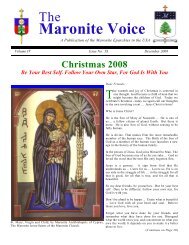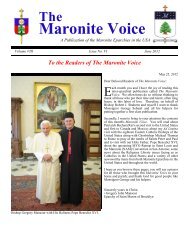Maronite Voice - Eparchy of Saint Maron of Brooklyn
Maronite Voice - Eparchy of Saint Maron of Brooklyn
Maronite Voice - Eparchy of Saint Maron of Brooklyn
You also want an ePaper? Increase the reach of your titles
YUMPU automatically turns print PDFs into web optimized ePapers that Google loves.
“He Fasted for Forty Days and Forty Nights and Afterwards HeWas Hungry.”Message Of His Holiness Pope Benedict XVI For Lent 2009On February 3, 2009, the 2009 Lenten Message <strong>of</strong> the Holy Father Pope Benedict XVI was madepublic. The text, dated December 11, 2008, has as its title “He Fasted for Forty Days and FortyNights, and Afterward He Was Hungry.” Following is the Pope’s Message as reported by Zenit.org.Dear Brothers and Sisters!At the beginning <strong>of</strong> Lent, whichconstitutes an itinerary <strong>of</strong> moreintense spiritual training, theLiturgy sets before us again threepenitential practices that are very dearto the biblical and Christian tradition --prayer, almsgiving, fasting -- to prepareus to better celebrate Easter and thusexperience God's power that, as weshall hear in the Paschal Vigil, "dispelsall evil, washes guilt away, restores lostinnocence, brings mourners joy, castsout hatred, brings us peace and humblesearthly pride." For this year's LentenMessage, I wish to focus my reflectionsespecially on the value and meaning <strong>of</strong>fasting. Indeed, Lent recalls the fortydays <strong>of</strong> our Lord's fasting in the desert,which He undertook before enteringinto His public ministry. We read in theGospel: "Jesus was led up by the Spiritinto the wilderness to be tempted by thedevil. He fasted for forty days and fortynights, and afterwards he was hungry"(Mt 4:1-2). Like Moses, who fastedbefore receiving the tablets <strong>of</strong> the Law(cf. Ex 34:28) and Elijah's fast beforemeeting the Lord on Mount Horeb (cf.1 Kings 19:8), Jesus, too, throughprayer and fasting, prepared Himself forthe mission that lay before Him, markedat the start by a serious battle with thetempter.******We might wonder what value andmeaning there is for us Christians indepriving ourselves <strong>of</strong> something that initself is good and useful for our bodilysustenance. The Sacred Scriptures andthe entire Christian tradition teach thatfasting is a great help to avoid sin andall that leads to it. For this reason, thehistory <strong>of</strong> salvation is replete withoccasions that invite fasting. In the veryfirst pages <strong>of</strong> Sacred Scripture, the Lordcommands man to abstain frompartaking <strong>of</strong> the prohibited fruit: "Youmay freely eat <strong>of</strong> every tree <strong>of</strong> thegarden; but <strong>of</strong> the tree <strong>of</strong> the knowledge<strong>of</strong> good and evil you shall not eat, for inthe day that you eat <strong>of</strong> it you shall die"(Gn 2: 16-17). Commenting on thedivine injunction, <strong>Saint</strong> Basil observesthat "fasting was ordained in Paradise,"and "the first commandment in thissense was delivered to Adam." He thusconcludes: "'You shall not eat' is a law<strong>of</strong> fasting and abstinence" (cf. Sermo dejejunio: PG 31, 163, 98). Since all <strong>of</strong> usare weighed down by sin and itsconsequences, fasting is proposed to usas an instrument to restore friendshipwith God. Such was the case with Ezra,who, in preparation for the journeyfrom exile back to the Promised Land,calls upon the assembled people to fastso that "we might humble ourselvesbefore our God" (8:21). The Almightyheard their prayer and assured them <strong>of</strong>His favor and protection. In the sameway, the people <strong>of</strong> Nineveh, respondingto Jonah's call to repentance,proclaimed a fast, as a sign <strong>of</strong> theirsincerity, saying: "Who knows, Godmay yet repent and turn from his fierceanger, so that we perish not?" (3:9). Inthis instance, too, God saw their worksand spared them.******In the New Testament, Jesus bringsto light the pr<strong>of</strong>ound motive forfasting, condemning the attitude <strong>of</strong> thePharisees, who scrupulously observedthe prescriptions <strong>of</strong> the law, but whosehearts were far from God. True fasting,as the divine Master repeats elsewhere,is rather to do the will <strong>of</strong> the HeavenlyFather, who "sees in secret, and willreward you" (Mt 6:18). He Himself setsthe example, answering Satan, at theend <strong>of</strong> the forty days spent in the desertthat "man shall not live by bread alone,but by every word that proceeds fromthe mouth <strong>of</strong> God" (Mt 4:4). The truefast is thus directed to eating the "truefood," which is to do the Father's will(cf. Jn 4:34). If, therefore, Adamdisobeyed the Lord's command "<strong>of</strong> thetree <strong>of</strong> the knowledge <strong>of</strong> good and evilyou shall not eat," the believer, throughfasting, intends to submit himselfhumbly to God, trusting in Hisgoodness and mercy.******The practice <strong>of</strong> fasting is verypresent in the first Christiancommunity (cf. Acts 13:3; 14:22;27:21; 2 Cor 6:5). The Church Fathers,too, speak <strong>of</strong> the force <strong>of</strong> fasting tobridle sin, especially the lusts <strong>of</strong> the"old Adam," and open in the heart <strong>of</strong>the believer a path to God. Moreover,fasting is a practice that is encounteredfrequently and recommended by thesaints <strong>of</strong> every age. <strong>Saint</strong> PeterChrysologus writes: "Fasting is the soul<strong>of</strong> prayer, mercy is the lifeblood <strong>of</strong>fasting. So if you pray, fast; if you fast,show mercy; if you want your petitionto be heard, hear the petition <strong>of</strong> others.If you do not close your ear to others,you open God's ear to yourself" (Sermo43: PL 52, 320. 322).In our own day, fasting seems to havelost something <strong>of</strong> its spiritual meaning,and has taken on, in a culturecharacterized by the search for materialwell-being, a therapeutic value for thecare <strong>of</strong> one's body. Fasting certainlybrings benefits to physical well-being,but for believers, it is, in the first place,a "therapy" to heal all that preventsthem from conformity to the will <strong>of</strong>God. In the Apostolic ConstitutionPænitemini <strong>of</strong> 1966, the Servant <strong>of</strong> GodPaul VI saw the need to present fastingwithin the call <strong>of</strong> every Christian to "nolonger live for himself, but for Himwho loves him and gave himself forhim, he will also have to live for hisbrethren" (cf. Ch. I). Lent could be apropitious time to present again thenorms contained in the ApostolicConstitution, so that the authentic andperennial significance <strong>of</strong> this long heldpractice may be rediscovered, and thusassist us to mortify our egoism andThe <strong><strong>Maron</strong>ite</strong> <strong>Voice</strong> Volume V Issue No. III Page 10 March 2009
















